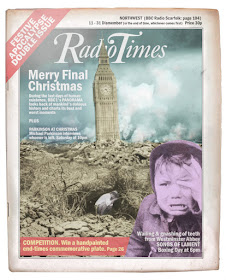Here's your festive double issue of the Radio Times, which covers Christmas to the new year (or the end of time, whichever comes first.)

Scarfolk is a town in North West England that did not progress beyond 1979. Instead, the entire decade of the 1970s loops ad infinitum. Here in Scarfolk, pagan rituals blend seamlessly with science; hauntology is a compulsory subject at school, and everyone must be in bed by 8pm because they are perpetually running a slight fever. "Visit Scarfolk today. Our number one priority is keeping rabies at bay." For more information please reread.
▼
Friday, 23 December 2016
Radio Times Christmas Issue
Everyone at Scarfolk Council wishes you a very merry final Christmas before the inevitable apocalypse.
Here's your festive double issue of the Radio Times, which covers Christmas to the new year (or the end of time, whichever comes first.)
Learn more about the jolly apocalypse HERE.
Here's your festive double issue of the Radio Times, which covers Christmas to the new year (or the end of time, whichever comes first.)
Thursday, 15 December 2016
Disposable Children Bags
Discarded children were a serious problem in 1970s Scarfolk. Adults who had decided against parenthood, whether for reasons of finance or boredom, would dump their offspring in sacks by roadsides or in laybys.
Hungry children who had not been given the required sedative dosages often chewed their way out of the sacks and wandered into speeding traffic. Not only did these unwanted children cause hours of unnecessary delays to motorists, but a study showed that discarded children were responsible for close to a million pounds worth of damage to car bonnets, bumpers and windscreens in 1974 alone.
From January 1975, any 'Bag Baby' (as they came to be known) involved in a road accident that incurred costs to motorists, risked a fine of up to £125.
Thursday, 8 December 2016
BBC Sound Effects Records (early 1970s)
In the early 1970s, the BBC produced numerous sound effects records. Though many were created for educational purposes, such as 'Squeaky Eyeballs' (1973), the public were encouraged to utilise the more practical releases in their daily lives.
Not all deceptions were successful. If a family was arrested they would be taken to their local police station where, while waiting to be interrogated by specialised officers, they might be played an album such as 'Uncomfortable Silences'.
Expressing emotion or personal thoughts in both private and public had long been outlawed. Records such as 'British Tutting' (1970) allowed the disgruntled listener to listen to a variety of legally sanctioned tuts as a sort of surrogate expression of displeasure. Equally, 'Inconsolable Weeping in Libraries' was a soothing, lawful substitute for the act itself.
As familial contentment was also prohibited in the 1970s (apart from at Christmas when it was compulsory. See HERE), some families, frightened that their satisfaction might be discovered and reported, opted for albums such as those from the BBC's Divorce Series, which they would play at elevated volumes for the ears of prying neighbours or passing government agents.Not all deceptions were successful. If a family was arrested they would be taken to their local police station where, while waiting to be interrogated by specialised officers, they might be played an album such as 'Uncomfortable Silences'.
Thursday, 1 December 2016
Council Advent Cards
In 1970s Scarfolk, the council sent out personalised advent cards to all its citizens.
Not only did the cards hint cryptically at policies due to be introduced in the new year, but they were also frequently accompanied by updated citizen expiration details (see HERE).
The more observant among you may have spotted Charlie Barn on the roof.
More on advent HERE.
Not only did the cards hint cryptically at policies due to be introduced in the new year, but they were also frequently accompanied by updated citizen expiration details (see HERE).
The more observant among you may have spotted Charlie Barn on the roof.
More on advent HERE.










